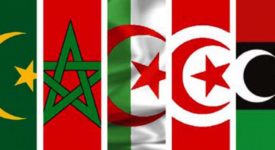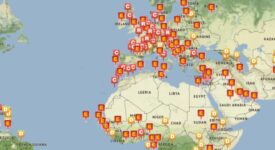Ever since street protests overthrew the dictator Zine El Abidine Ben Ali in January 2011, Tunisians have been able to vote in free elections, speak out with little fear of repression and spared the vice-like grip of security forces, an enviable situation compared with all their Arab neighbours. A decade later, people once thrilled by the potential benefits of change are dumbfounded by its actual costs. When president Kais Saied sacked his prime minister and suspended parliament on 25 July, he caught Tunisians and foreign powers by surprise. Neither the US nor the EU had any inkling of what was about to unfold.
It was not Islam or poverty itself that provoked the uprising – it was the crushing humiliation that had deprived the majority of Tunisians who are under the age of thirty the right to assert control over their own lives. “Hiya thawrat karama” (this is a revolution of “honour, dignity”) shouted the demonstrators in the streets of Sidi Bouzid in the poor uplands of Tunisia. The revolt surprised Western leaders because the country had been held up by the World Bank and the European Union as a model of good governance. It was a convenient myth, a camouflage for practises which, under the guise of liberalism and privatisation, had become increasingly predatory. Most Tunisians instinctively understood that hypocrisy and an orientalist reading of the Middle East did not allow the West to understand.
Ten years later, the bold move by Kais Saied may give Tunisia fledgling democracy a second chance. The appointment of Colonel-Major Khaled Yahyaoui, who is in charge of the president’s security and an officer of the highest republican integrity, to oversee the interior ministry till the formation of a new government, speaks of the president´s attachment to preserving individual liberties in Tunisia. Other senior security and army officers such as retired Admiral Kamel Akrout who recently called on Saied to invoke Article 80 of the Constitution and denounced the government’s intention to rent out state lands to Qatari investors, thus nipping the project in the bud, appear to be playing a supportive role in the move. Akrout, who hails from a humble family also said he was appalled by the fact that 25% of Tunisians lived in absolute poverty.
Tunisia’s army is professional, non political and has no economic interests. It is unlike any other army in the Arab world. As a de facto guarantor of the integrity of the state, many of its officers no doubt welcome what amounts to a curtain call for the chaotic and corrupt form of “democratic” politics the leading political leaders have imposed on the country. The Tunisian army had backed the president’s bold move as it helped facilitate the departure of Ben Ali ten years ago. It is a small, US trained force which has since independence enjoyed the respect of the majority of Tunisians. It remains the most trusted state institution. By contrast, the Islamist Ennahda leader Rached Ghannouchi was quick to denounce a coup but he must share the blame for the race to the bottom which has characterized the country’s economy since 2011 and the government’s inadequate handling of the Covid-19 pandemic. The party’s incompetence when it comes to capitalist management, rentier vision of the economy and incapacity to mobilize the country’s domestic resources is shared by most political parties across the region.
Ennahda’s strategy, which it shared with the capitalist and bureaucratic elites whose power and ability to manipulate the system were left untouched by the political changes sweeping the country, condemned Tunisia, a society very open to new western ideas, to continue with the growth deficit responsible for sizeable, steadily rising unemployment rates under Ben Ali, especially among young people. Today, unemployment rates are higher than in 2011, living standards have dropped, regional disparities are as stark as ever. A majority of young Tunisians dream of leaving what they see as a sinking ship. In their eyes, the concept of democracy has been sullied by the practise of politics of the major parties.
Western observers might think of the country as a “nascent democracy”, but rampant corruption, a parliament which resembles nothing so much as a noisy souk, a clearing house acts as a clearing house for money deals rather than ideas, deputies who physically abuse one another hardly commends the democratic credentials of its speaker, Rached Ghannouchi. The second largest party Qalb Tounes is led by a media mogul, Nabil Karoui who has spent time in prison for alleged money laundering and tax evasion. Meanwhile, Kais Saied was elected by a landslide in 2019 but governing will put his political skills to a greater test than presiding. One of the reasons he chose to cut the Gordian knot is that the Constitution of 2014 does not define the powers of the head of state and prime minister, let alone the speaker of parliament, with any clarity. The consequence was endless wrangling between the three with a prime minister which a senior businessman in Tunis describes as “monumentality incompetent”.
Tens of thousands of Tunisians of every age and social condition took to the streets to celebrate after the president’s decision was announced on Sunday (25 July) night. They were clamouring for a strong leader, respect, and dignity, which they thought they had won in 2011, and jobs. As he turns from striking an unyielding moral position to running the country, Kaid Saied’s political skills will be tested to the full. So will the army’s popularity. On Monday (26 July), the president solemnly promised to uphold the individual rights of his countrymen and talked to the US secretary of state Anthony Blinken who was supportive. He followed this with a call to the Algerian head of state, whose foreign minister, Ramtane Lamamra flew to Tunis on Monday. On Tuesday (27 July), Saied spoke with Charles Michel, the president of the European Council. Support from such heavyweights will be key to Saied’s eventual success.
Contrary to some Western and Middle East media, most Tunisians do not see themselves or their president as burying a “democracy” whose promised economic and social benefits they never enjoyed. Some western and Arab media describe Tunisia as a “fragile democracy”. Many Tunisians, a majority probably see themselves, as their president, as fighting a state captured by corrupt political and business lobbies which were leading it to ruin. Like any bold move, president Saied´s carries risks. The next few weeks will tell whether he was operating on a wing and a prayer or from a proper road map.
‘Kais Saied Gives Tunisian Democracy a Second Chance’ — Opinion by Francis Ghilès — Barcelona Centre for International Affairs / CIDOB.







